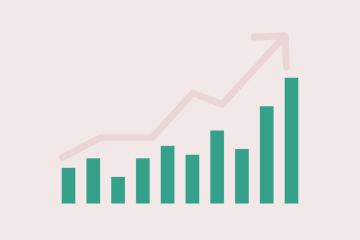
How inflation can deplete your hard-earned money, and ways to fight it
Inflation can take a toll on your money — if you let it. Here, we share strategies for fighting inflation, like investing and taking advantage of high-interest savings accounts.
10 min read
The following statements do not constitute investment advice or any other advice on financial services, financial instruments, financial products or digital assets. They are intended to provide general information. The following statements do not constitute an offer to conclude a contract for the purchase or sale of financial instruments and financial products or an invitation to submit such an offer and to buy or sell any particular digital asset.Stocks and ETFs are subject to high fluctuations in value. A decline in value or a complete loss are possible at any time. The loss of access to data and passwords can also lead to a complete loss.
If you’ve been following the news over the last two years, you’ve probably heard a lot about inflation. More importantly, you’ve likely experienced the impact of it in your own life, with prices rising on everything from groceries to utilities to consumer products and services. October 2022 saw record inflation in the EU at 11.5%, which decreased to just 3.6% in October of 2023. The European Central Bank responded by raising interest rates to a 22-year high of 3.5% in June 2023. And though inflation has ebbed somewhat, many of us are still feeling the sting in our bank accounts.Inflation is an eroding of your money’s purchasing power over time. This phenomenon can affect your ability to meet your basic needs, and take a toll on your hard-earned savings. But the good news is that there are some actions you can take to mitigate the worst effects of inflation and protect your money over the long term. In this guide, we’ll explore the impacts of inflation on your money, and give you some tips on what you can do to stay ahead of the game.Inflation is the increase of prices over time, causing currency to lose its value. It means that you can buy less with your money than you could previously.
The inflation rate is the measurement of that lost value as a percentage, based on both the face value of your money and what you’re able to buy with it. It’s basically an assessment of how quickly the prices of goods and services are rising. Let’s look at an example. Say you want to buy an apple for €1. If inflation is at 10%, that same apple would cost you €1.10 one year later — meaning your money is now worth 10% less than it was one year prior. Inflation happens for lots of different reasons, most of them due to an influx of money circulating in an economy, as well as supply and demand issues. If the supply of a raw material or product is too short, prices will go up. Additionally, if demand for a product increases because everyone has plenty of cash to spend, prices may also rise. As a response to inflation, central banks generally raise interest rates to slow borrowing and spending and tamp down price growth. Higher interest rates mean that it’s more expensive to borrow and more lucrative to keep your money in a savings account. This means less money circulating in the economy, which tends to drive prices down and purchasing power up. Ideally, higher interest rates will put pressure on companies to lower their prices until supply and demand come back into balance. But it’s a delicate balance: If banks raise interest rates too high and too quickly, they could slow down the job market, which can lead to deflation, unemployment, and even trigger a recession. To get a deeper understanding about the basics of inflation, read our guide here. Let’s face it: A small amount of price increases from year to year are to be expected. They may even signal a healthy economy overall. But as soon as prices start to rise uncontrollably, the economy has got a mess on its hands.There are plenty of downsides to inflation. When everything starts to cost more, folks have to spend more of their hard-earned money to meet their basic needs. This raises the cost of living, but it also means that the money you have in savings is worth less than it was a year ago. What’s more, when central banks raise interest rates to curb inflation, the price of lending money becomes much more expensive, too, meaning that it’s pricier to buy a house or a car. Low-income individuals and younger folks generally suffer the most from inflation. That’s because they tend to spend a higher percentage of their income on necessities such as rent, food, and utilities. And the more money is leaving their accounts, the less they have to set aside or invest in products that will help them keep up with inflation. Furthermore, wages for lower-income households don’t always keep up pace with inflation. Across Europe, even though wages rose in 2023, they still didn’t get high enough to combat the effects of inflation. Another issue is that assets like homes and savings are generally unachievable for those with lower salaries, meaning that these types of mitigating investments are often out of reach. It’s pretty evident how rising prices force you to spend more of your income on a day-to-day basis, but what about all that money sitting in your bank account? If you’ve been a diligent saver, does that protect your money from the worst effects of inflation?Not quite. Let’s say you have €100 in your checking account. If inflation is lower — a common target for governments is around 2% per year — you’ll need just €102 to have the same purchasing power as you did a year prior. Now, let’s say you have that same €100 set aside in a savings account with an interest rate of 2%. The good news is that you’ll earn €2 in interest on your €100. But if inflation is at 10% over the course of that year, instead of that €102 getting you more bang for your buck, you’d need €110 to have the same purchasing power as one year prior. And if inflation keeps rising, you’ll continue to lose value on your savings if you don’t find ways to increase your money. While it may not be possible to avoid the effects of inflation completely, there are some things you can do to curb it. From taking advantage of higher interest rates to increasing your earnings to checking up on your budget, here are some ideas to protect your money. One of the upsides of rising interest rates is that savings products offer more competitive returns. A great option for combating inflation is to place your cash in a savings product where it will earn interest, such as savings account, passbooks, and fixed-term deposit accounts. If you can lock in a high interest rate for a savings product at a bank, for example, your money will hopefully grow in tandem with inflation — and could outpace it. Many high-yield savings accounts require you to deposit a designated sum of money, agreeing to lend it to your bank for a fixed interest rate for a predetermined period. Note that you may not be able to touch this money for the agreed-upon term (usually up to 10 years) unless you pay an access fee, so it’s never a good idea to deposit money you’ll need to live on. If you’d like to have a more accessible option, consider an easy-access savings account. Although riskier, investing can also be a powerful way to combat inflation. Historically, returns on equities tend to beat inflation, as long as you have a longer time horizon to work with. Capital gains and dividends from companies could help you earn money with your money, thereby fighting the decrease in your purchasing power. Stocks are the most volatile option, while government bonds are considered to be safer — though also not without risks. ETFs and/or index funds offer a wider variety of stock and bond products, spreading your investments broadly across the market rather than putting them into a single company. When it comes to investing, it’s important to remember that both gains and losses can happen — so never invest more money than you’re willing to lose. One of the key reasons that people struggle with inflation is that their salaries don’t always rise in accordance with prices. Furthermore, some employees don’t take the initiative to ask for more money — whether it’s out of a fear of rejection or struggles with imposter syndrome. If inflation is affecting your pocketbook and your livelihood, then it may be time to consider negotiating a higher salary. Researching what professionals at your level are paid and knowing your worth is a great first step to getting the pay you deserve. Even if you just receive €70 more per month, that’s €840 per year, and €2,520 over the course of three years. That’s a good start to fighting rising costs. Plus, it’s good practice at negotiating, which can set you up for more career success over the long term. One of the reasons inflation can wreak such havoc is that it impacts your daily spending. If you’ve had a working budget in place that accounted for all your groceries, bills, and savings goals, you might find that it’s no longer sufficient. Instead of simply spending more, consider cutting back where you can. One option is to look at what’s driving inflation. Use a monthly budget calculator each month to update your expenses as needed. There are some essentials that you probably can’t eliminate, but you can cut back on everything from groceries to subscriptions with a little discipline and creativity. Another idea is to educate yourself on what’s driving inflation, as some goods are more likely to be affected than others. This way, you can save some money and learn about the global economy at the same time. High inflation is especially disruptive to the global economy, so it’s good to have precautions in place. One of the best ways to do that is to have an emergency fund. An emergency fund is money you set aside for an unforeseen event. The idea is that when you need some extra cash, you have it ready. Most experts agree that having three to six months of living expenses saved up is the ideal. Keep that money secure in a separate sub-account, or put it in an easy-access savings account. This way, you can grow your money with interest while also being able to access it whenever you need it.
Whether you’re saving up for a big purchase or setting money aside to curb the effects of inflation, living on a budget doesn't have to be difficult. With N26, you’ll receive push notifications when money enters or leaves your account, so you can track your finances in real time. Plus, keep your budget under control with daily spending and withdrawal limits, right in the N26 app. If you want to get serious about saving, check out our beginner's savings guide. Then, explore our tips for how to stay on track by saving money each month. And with N26 Perks, get access to your favorite activities, services, and products — without blowing your budget. All N26 accounts include exciting offers from our partner brands, from travel to education to entertainment. You can get a great deal and still meet your savings goals — even during a recession.
If you’ve been following the news over the last two years, you’ve probably heard a lot about inflation. More importantly, you’ve likely experienced the impact of it in your own life, with prices rising on everything from groceries to utilities to consumer products and services. October 2022 saw record inflation in the EU at 11.5%, which decreased to just 3.6% in October of 2023. The European Central Bank responded by raising interest rates to a 22-year high of 3.5% in June 2023. And though inflation has ebbed somewhat, many of us are still feeling the sting in our bank accounts.Inflation is an eroding of your money’s purchasing power over time. This phenomenon can affect your ability to meet your basic needs, and take a toll on your hard-earned savings. But the good news is that there are some actions you can take to mitigate the worst effects of inflation and protect your money over the long term. In this guide, we’ll explore the impacts of inflation on your money, and give you some tips on what you can do to stay ahead of the game.
A brief look at inflation and how it works
The impact of inflation on the economy
How inflation eats away at your savings
Strategies to beat inflation and protect your savings
Open a high-yield savings account
Consider investing a portion of your savings
Make sure you’re getting paid what you’re worth
Keep an eye on your budget, and adjust it as needed
Bolster your emergency fund
Saving with N26
Find similar stories
BY N26Love your bank
Related Post
These might also interest youBANKING BASICSDear Money: an exercise for rewriting your financial scriptsWhether you feel stuck, anxious, or ready to make a change, writing a letter to money can help you reflect on and reset your financial mindset.
5 min read
INVESTBear market: This is what it meansIf you think a bear market sounds rather scary, you’re already on the right track. In this article, you’ll learn what a bear market is, why it occurs, how it affects your assets and how long it lasts.
11 min read
INVESTBull markets: What they mean for your moneyNot sure what bulls have to do with the financial world? The term is mostly symbolic — but bull markets can have significant effects on your investments. Read on to learn what a bull market is.
10 min read


